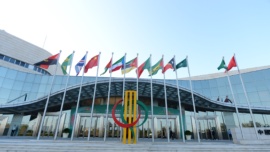The Gross Domestic Product figures for the second quarter of the year confirm a severe contraction in the economy. For the last four full quarters, the real rate of growth has been in negative territory. For the last half year, the economy shrank by one quarter, give or take a few percentage points, compared with the same period last year. This is not a trivial oscillation. We are dealing with a neat recession. If we look at the figures for the main driver of the economy, exports of services, the numbers are even starker. Exports of services are essentially gambling and satellite activities. Overall, those exports dropped by almost 36 per cent; in the particular case of gambling, which weights about half of the economy, the fall was greater than 40 per cent. Growth-wise, if there is a silver lining in these figures, it s hard to spot. Even investment, which was still growing at positive rates, had its homologous rate diving. The growth rate for construction, which stood above 50 per cent in the second quarter of last year, was at 5 per cent in the last quarter. The investment boom seems to have halted, reflecting a reassessment of growth trends by all the operators. Cotai 2.0 investment plans are inevitably under review. The pressure put on the gambling sector to curtail grey flows of capital is taking a heavy toll; and pressing where it hurts. The raid on UnionPay machines last week indicates the commitment to sustaining that pressure and does show no signs of relenting. Direct impact aside, the situation will contribute to further reducing the attraction of Macau as a destination, especially in the VIP segment. It is the visibility and excess of publicity for not-so-appealing reasons; it is the risk of many enquiring eyes around and of calling for undesired attention. Other clouds may be forming. Two events occupied much space in the media lately. Neither is a harbinger of hope. Both the crash on the Shanghai Stock Exchange and the devaluation of the yuan have shown the authorities less self-assured that usual. And their intervention wasnt exactly successful. There are growing concerns that the Chinese economy is in less fair fettle than we were led to believe; and that the authorities may be over-stretching their control efforts. Should the next months, if not weeks, confirm these worries, economic confidence will take another blow. Greater uncertainty about their future income will lead Chinese consumers to start reducing expenses in less essential types of goods and services. That would inevitably affect the number of visitors to Macau and the patterns of their expenditure, placing downward pressure also on the so-called mass market segment. The sector by extension, the economy could find itself gripped by a sort of tweezers. The Macau transition may take longer and be more painful than most expected and, indeed, all would desire.
Top Stories
RELATED ARTICLESMORE FROM AUTHOR
Enhancing Macau’s Role as a Bridge between China and Portuguese-speaking Countries for Building a Community...
By Liu Xianfa, Commissioner of the Ministry of Foreign Affairs of the People’s Republic of...
OPINION – Enhancing Tourist Experience and Protection: Recommendations for the Historic Centre of Macau
Macau, as a travel destination, is world-renowned for its vibrant entertainment gambling, rich cultural heritage,...
OPINION – The Influence of Many, the Power of One
In January of this year, I reached out to my Corporate Social Responsibility expert colleagues...
OPINION – Blue natural assets
The sea seems cheap. Water does not have to be built (like railways) or repaired...























